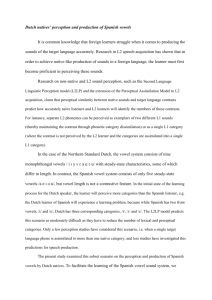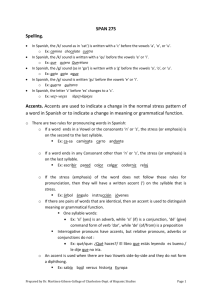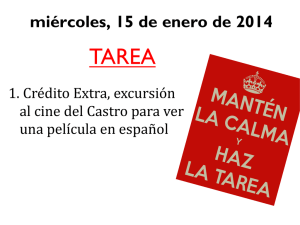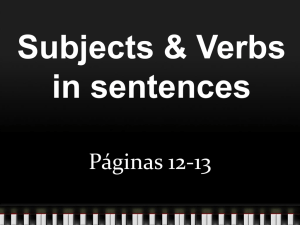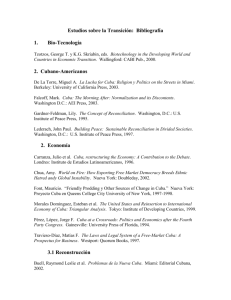Bibliografía sujetos en español dominicano
advertisement
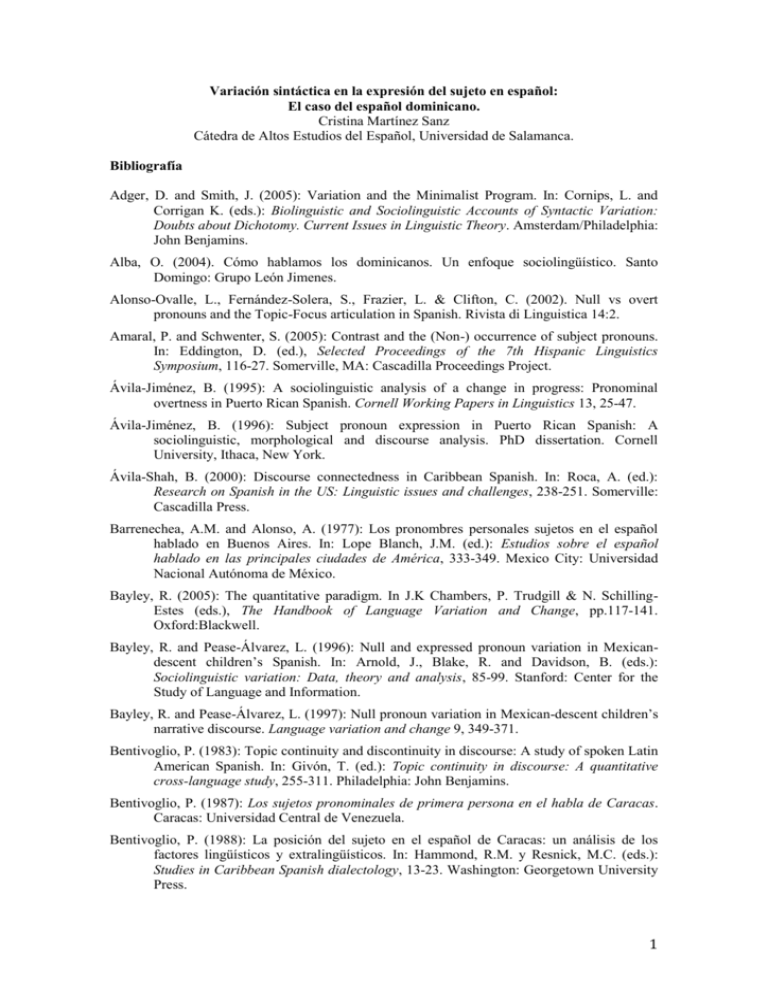
Variación sintáctica en la expresión del sujeto en español: El caso del español dominicano. Cristina Martínez Sanz Cátedra de Altos Estudios del Español, Universidad de Salamanca. Bibliografía Adger, D. and Smith, J. (2005): Variation and the Minimalist Program. In: Cornips, L. and Corrigan K. (eds.): Biolinguistic and Sociolinguistic Accounts of Syntactic Variation: Doubts about Dichotomy. Current Issues in Linguistic Theory. Amsterdam/Philadelphia: John Benjamins. Alba, O. (2004). Cómo hablamos los dominicanos. Un enfoque sociolingüístico. Santo Domingo: Grupo León Jimenes. Alonso-Ovalle, L., Fernández-Solera, S., Frazier, L. & Clifton, C. (2002). Null vs overt pronouns and the Topic-Focus articulation in Spanish. Rivista di Linguistica 14:2. Amaral, P. and Schwenter, S. (2005): Contrast and the (Non-) occurrence of subject pronouns. In: Eddington, D. (ed.), Selected Proceedings of the 7th Hispanic Linguistics Symposium, 116-27. Somerville, MA: Cascadilla Proceedings Project. Ávila-Jiménez, B. (1995): A sociolinguistic analysis of a change in progress: Pronominal overtness in Puerto Rican Spanish. Cornell Working Papers in Linguistics 13, 25-47. Ávila-Jiménez, B. (1996): Subject pronoun expression in Puerto Rican Spanish: A sociolinguistic, morphological and discourse analysis. PhD dissertation. Cornell University, Ithaca, New York. Ávila-Shah, B. (2000): Discourse connectedness in Caribbean Spanish. In: Roca, A. (ed.): Research on Spanish in the US: Linguistic issues and challenges, 238-251. Somerville: Cascadilla Press. Barrenechea, A.M. and Alonso, A. (1977): Los pronombres personales sujetos en el español hablado en Buenos Aires. In: Lope Blanch, J.M. (ed.): Estudios sobre el español hablado en las principales ciudades de América, 333-349. Mexico City: Universidad Nacional Autónoma de México. Bayley, R. (2005): The quantitative paradigm. In J.K Chambers, P. Trudgill & N. SchillingEstes (eds.), The Handbook of Language Variation and Change, pp.117-141. Oxford:Blackwell. Bayley, R. and Pease-Álvarez, L. (1996): Null and expressed pronoun variation in Mexicandescent children’s Spanish. In: Arnold, J., Blake, R. and Davidson, B. (eds.): Sociolinguistic variation: Data, theory and analysis, 85-99. Stanford: Center for the Study of Language and Information. Bayley, R. and Pease-Álvarez, L. (1997): Null pronoun variation in Mexican-descent children’s narrative discourse. Language variation and change 9, 349-371. Bentivoglio, P. (1983): Topic continuity and discontinuity in discourse: A study of spoken Latin American Spanish. In: Givón, T. (ed.): Topic continuity in discourse: A quantitative cross-language study, 255-311. Philadelphia: John Benjamins. Bentivoglio, P. (1987): Los sujetos pronominales de primera persona en el habla de Caracas. Caracas: Universidad Central de Venezuela. Bentivoglio, P. (1988): La posición del sujeto en el español de Caracas: un análisis de los factores lingüísticos y extralingüísticos. In: Hammond, R.M. y Resnick, M.C. (eds.): Studies in Caribbean Spanish dialectology, 13-23. Washington: Georgetown University Press. 1 Bentivoglio, P. (1994): Spanish Preferred Argument Structure across Time and Space: DELTA 10, 277-293. Biberauer, T. and Roberts, I. (2006): The loss of “head-final” orders and remnant fronting in Late Middle English: causes and consequences. In: Hartmann, J. and Molnárfi, L. (eds.): Comparative Studies in Germanic Syntax: from A(frikaans) to Z(ürich German), 263297. Amsterdam: Benjamins. Bosque, I. (1999): On focus vs. wh-movement: The case of Caribbean Spanish. Sophia Linguistica: Working papers in linguistics 44-45, 1-32. Bullock and Toribio (2009): Reconsidering Dominican Spanish: Data from the rural Cibao. Revista Internacional de Lingüística Iberoamericana 14, 49-73. Bullock, B. and Toribio, A.J. (2007): Kreyol incursions into Dominican Spanish: The percept of Haitianized speech among Dominicans. In: Niño-Murcia, M. and Rothman, J. (eds.): Linguistic identity and bilingualism, 175-198. John Benjamins Publishers. Burzio, L. (1986): Italian syntax: a Government-Binding approach. Dordrecht: Kluwer. Camacho, J. (2006a): In situ Focus in Caribbean Spanish: Towards a Unified Account of Focus. In: Sagarra, N. and Toribio, A.J. (eds): Selected Proceedings of the 9th Hispanic Linguistics Symposium, 13-23. Camacho, J. (2006b): Do subjects have a place in Spanish? In: Nishida, C. and Montreuil, J. (eds.): New perspectives in Romance linguistics, 51-66. Amsterdam: John Benjamins. Camacho, J. (2008): Syntactic Variation: The case of Spanish and Portuguese Subjects. To appear in: Studies in Hispanic and Lusophone Linguistics 2. Camacho, J. (2013): Null Subjects. Cambridge: Cambridge University Press. Cameron, R. (1992): Pronominal and null subject variation in Spanish: Constraints, dialects and functional compensation. PhD dissertation. Philadelphia: University of Pennsylvania. Cameron, R. (1993): Ambiguous agreement, functional compensation, and nonspecific tú in the Spanish of San Juan, Puerto Rico, and Madrid, Spain. Language Variation and Change 5, 305-334. Cameron, R. (1994): Switch reference, verb class and priming in a variable syntax. Papers from the Regional Meeting of the Chicago Linguistic Society: Parasession on variation in linguistic theory 30(2), 27-45. Cameron, R. (1995): The scope and limits of switch reference as a constraint on pronominal subject expression. Hispanic Linguistics 6/7, 1-27. Cameron, R. (1996): A community-based test of a linguistic hypothesis. Language in Society 25, 61-111. Cameron, R. and Flores-Ferrán, N. (2004): Preservation of subject expression across regional dialects of Spanish. Spanish in Context 1(1), 41-65. Cardinaletti, A. and Starke, M. (1999): The typology of structural deficiency: A case study of the three classes of pronouns. In: van Riemsdijk, H. (ed.): Clitics in the languages of Europe, 145-235. Berlin: Mouton de Gruyter. Chaudenson, R. (1979): Les créoles français. Paris: Nathan. Chaudenson, R. (1992). Des îles, des hommes, des langues. Essai sur la créolisation linguistique et culturelle. Paris: L’Harmattan. Chomsky, N. (1981): Lectures on Government and Binding. Dordrecht: Foris. Chomsky, N. (1986): Knowledge of language: its nature, origin, and use. Praeger: New York. 2 Chomsky, N. (1995): The minimalist program. Cambridge, MA: MIT Press. Chomsky, N. (2000): Minimalist inquiries: the framework. In: Martin, R., Michaels, D. and Urigareka, J. (eds.): Step by step: essays on minimalist syntax in honor of Howard Lasnik, 89-156. Cambrige, MA: MIT Press. Chomsky, N. (2001): Derivation by phase. In: Kenstowicz, M. (ed.): Ken Hale: a life in language, 1-53. Cambridge, MA: MIT Press. Chomsky, N. (2004): Beyond explanatory adequacy. In: Belletti, A. (ed.): Structures and beyond: the cartography of syntactic structures Vol. 3, 104-13. Oxford: Oxford University Press. Cifuentes, R. (1981): 'Presencia y ausencia del pronombre personal en el habla culta de Santiago de Chile'. Homenaje a Ambrosio Rabanales. Boletín de Filología de la Universidad de Chile, XXXI. Comínguez, J.P. (2013): Microvariation in Caribbean Spanish interrogative wh-movement. Presented at the International Workshop on the Syntactic Variation of Catalan and Spanish Dialects. Universitat Autónoma de Barcelona. Cornips, L. (1998): Syntactic variation, parameters and their social distribution. Language Variation and Change 10, 1-21. Cornips, L. and Corrigan, K. (2005a): Syntax and variation: reconciling the biological and the social. Amsterdam: John Benjamins. Cornips, L. and Corrigan, K. (2005b): Convergence and divergence in grammar: In: Auer, P., Hinskens, F. and Kerswill, P. (eds.): Dialect Change: Convergence and Divergence in European Languages, 96-134. Cambridge: Cambridge University Press. Cornips, L. and Corrigan, K. (2005c): Toward an integrated approach to syntactic variation: A retrospective and prospective synopsis. In: Cornips, L. and Corrigan, K.P. (eds.): Syntax and Variation: Reconciling the Biological and the Social, 1-30. Amsterdam: John Benjamins. de Prada, A. (2009): Subject expression in Minorcan Spanish: Consequences of contact with Catalan. PhD dissertation, The Pennsylvania State University. Duarte, M.E. (1992): A perda da ordem V(erbo) S(ujeito) em interrogativas qu- no português do Brasil. D.E.L.T.A. 8, 37-52. Duarte, M.E. (1993): Do pronome nulo ao pronome pleno. In: Roberts, I. and Kato, M. (eds.): Português Brasilero: Uma viagem diacrônica (Homenagem a Fernando Tarallo), 10728. Campinas, SP, Editora da UNICAMP. Duarte, M.E. (1995): A perda do princípio ‘evite o pronome’ no português brasileiro. PhD dissertation. Campinas: Unicamp. Duarte, M.E. (2000): The loss of the ‘Avoid Pronoun’ principle in Brazilian Portuguese. In: Kato, M. and Negrão, E. (eds.): Brazilian Portuguese and the null subject parameter, 17-36. Frankfurt: Vervuert. Enríquez. E. (1984): El pronombre personal sujeto en la lengua española hablada en Madrid. Madrid: Consejo Superior de Investigaciones Científicas. Esgueva, M. y Cantarero, M. (1981): El habla de la ciudad de Madrid. Materiales para su estudio: Madrid: CSIC. Flores-Ferrán, N. (2002): Subject personal pronouns in Spanish narratives of Puerto Ricans in New York City: A sociolinguistic perspective. München: Lincolm Europa. 3 Flores-Ferrán, N. (2004): Spanish subject personal pronoun use in New York City Puerto Ricans: Can we rest the case of English contact? In: Language Variation and Change 16, 49-73. Flores-Ferrán (2007): A bend in the road: Subject personal pronoun expression in Spanish after 30 years of sociolinguistic research. Language and Linguistics Compass 4, 1-24. Flores-Ferrán, N., and Toro, J. (2000): The persistence of dialect features under conditions of contact and leveling. In: Southwest Journal of Linguistics 19, 31-42. Hamlaoui, F. (2007): French cleft sentences and the syntax-phonology inter- face. In: Proceedings of the 2007 annual conference of the Canadian Linguistic Association. Heap, D. (1990): Questions with preverbal subject in dominican spanish: Morphological variation and syntactic restructuring. Journal of the Atlantic Provinces Linguistic Association/Revue de l’Association de Linguistique des Provinces Altantique 14, 59-67. Henríquez Ureña, P. (1940): El español en Santo Domingo. Buenos Aires: Casa Editora Coni. Henry, A. (1995): Belfast English and Standard English: Dialect Variation and Parameter Setting. Oxford University Press. Henry, A. (1997): Viewing change in progress: The Loss of V2 in Hiberno-English imperatives. In: van Kemenade, A. and Vicent, N. (eds.): Parameters of morphosyntactic change, 273-296. Cambridge: Cambridge University Press. Henry, A. (2002): Variation and syntactic theory. In: Chambers, J., Trudgill, P. and SchillingEstes, N. (eds.): The Handbook of Language Variation and Change, 267-282. Malden: Blackwell. Hochberg, J. (1986): Functional compensation for /-s/ deletion in Puerto Rican Spanish. In: Language 62, 609-621. Jiménez Sabater, M. (1975): Más datos sobre el español de Santo Domingo. Santo Domingo: Instituto Tecnológico de Santo Domingo. Kato, M. and E. Negrão (2000): The null subject parameter in Brazilian Portuguese. Frankfurt: Vervuert-Iberoamericana. Kato, M. and Taralho (1983): Anything YOU can do in Brazilian Portuguese. In: Jaeggli, O., Silva-Corvalán, C. (eds.): Studies in Romance Linguistics. Dordrecht: Foris, 343-58. Kroch, A. (1989): Reflexes of grammar in patterns of language change. Language Variation and Change 1, 199-244. Kroch, A. (1994): Morphosyntactic variation. In: Beals, K., Knippen, R., Melnar, L., Suzuki, H. and Zeinfeld, E. (eds.): Proceedings of the 30th Regional Meeting of the Chicago Linguistic Society, 180-201. Chicago: University of Chicago Press. Labov, W. (1972): Sociolinguistic Patterns. Philadelphia: University of Pennsylvania Press. Labov, W. (1980): Locating language in time, space and society. Quantitative analyses of linguistic structure Vol. 1. New York: Academic Press. Labov, W. (1982): Bulding on empirical foundations. In: Lehmann, W. and Malkiel, Y. (eds.): Perspectives on historical linguistics, 17-92. Amsterdam and Philadelphia: John Benjamins. Labov, W. (1984): Field methods of the project on linguistic change and variation. In: Baugh, J. and Sherzer, J. (eds.): Language in use: readings in sociolinguistics, 28-54. Englewood Cliffs, NJ: Prentice-Hall. Labov, W. (1991): The three dialects of English. In: Eckert, P. (ed.): Quantitative Analyses of Sound Change, 1-44. New York: Academic Press. 4 Labov, W. (1994): Principles of linguistic change Vol. I, Internal factors. Cambridge and Oxford: Blackwell Publishers. Lapidus, N. and Otheguy, R. (2005): Overt nonspecific ellos in Spanish in New York. In: Spanish in Context 2, 157-174. Lapidus, N. and Otheguy, R. (2009): Shifting sensitivity to continuity of reference: Subject pronoun use in Spanish in New York City. In: Lacorte, M. and Leeman, J. (eds.): Español en Estados Unidos y otros contextos de contacto. Sociolingüística, ideología y pedagogía, 111-136. Frankfurt/Madrid: Vervuert Iberoamericana. Larrázabal Blanco, C. (1975): Los negros y la esclavitud en Santo Domingo. Santo Domingo: Julio D. Postigo e hijos, Editores. Lavandera, B. (1978): Where does the sociolinguistic variable stop? Language in Society 7, 171-83. Lipski, J. (1977): Preposed Subjects in Questions. Hispania 60, 61-7. Lipski, J. (1985): Creole Spanish and Vestigial Spanish: Evolutionary Parallels. Linguistics 23, 963-84. Lipski, J. (1991): In search of the Spanish personal infinitive. In: Wanner, D. and Kibbie, D. (eds.): New analyses in Romance linguistics, papers from the XVIII Linguistic Symposium on Romance Languages), 201-220. Amsterdam: John Benjamins. Lipski, J. (1994a): Latin American Spanish. New York: Longman Linguistics Library. Lipski, J. (1994b): The evolution of null subjects in Philippine Creole Spanish. Mid-America Linguistics Conference Papers, Volume II, 387-401. Lawrence, Kansas: University of Kansas Linguistics Department. Lipski, J. (1999): Null subjects in Romance-derived creoles: routes of evolution. Society for Pidgin and Creole Linguistics annual meeting. Los Angeles, January 8, 1999. Lipski, J. (2004): El español de América: los contactos bilingües. In: Cano, R. (ed.): Historia de la lengua española, 1117-1138. Barcelona: Ariel. Lizardi, C. (1993). Subject position in Puerto Rican wh-questions: Syntactic, sociolinguistic and discourse factors. PhD dissertation. New York: Cornell University. Lizardi , C. and Suñer, M. (1992): Dialectal variation in an argumentation/non-argumental asymmetry in Spanish. In: Amastae, J., Goodal, G., Montalbetti, M. and Phinney, M. (eds.): Contemporary Research in Romance Linguistics. Papers from the XXII Linguistic Symposium on Romance 2:83,84 López Morales, H. (1983): Estratificación sociolectal frente a diglosia en el Caribe hispánico. Lingüistica Española Actual 5, 205-22. Lozano, C. (2003): Universal Grammar and Focus constraints: The acquisition of pronouns and word order in non-native Spanish. University of Essex. Lunn, P. (2002): ‘Tout se tient’ in Dominican Spanish. In: Lee, J., Geeslin, K. and Clements, J.C. (eds.): Structure, meaning, and acquisition in Spanish, 65-72. Somerville, MA: Cascadilla. Luján, M. (1999): Expresión y omisión del pronombre personal. En I. Bosque & V. Demonte (eds.), Gramática descriptiva de la lengua española, vol. I (pp.1275-1315). Madrid: Espasa Calpe. Martínez-Sanz, C. and Toribio, A.J. (2008): On the nature of expletive ello in Dominican Spanish. Paper presented at the Hispanic Linguistics Symposium, Université Laval, Quebec. 5 McWhorter, J. (2001): The missing Spanish creoles: Recovering the birth of plantation contact languages. Berkeley: University of California Press. Medina-Rivera, A. (1991): Interaction of (s) and subject expression in the Spanish of Choluteca and El Paraíso, Honduras. Paper presented at NWAV XX, Washington DC. Meechan, M and Foley, M. (1994): On resolving disagreement: linguistic theory and variation there’s bridges. Language Variation and Change 6, 1. 63-85. Megenney (1984): Elementos subsaháricos en el español dominicano. In: Alba. O. (ed): El español del Caribe. Santiago de los Caballeros: Universidad Católica Madre y Maestra, 183-201. Megenney (1990): África en Santo Domingo. La herencia lingüística. Santo Domingo: Museo del Hombre Dominicano. Miró Vera, R. and de Pineda, A. (1982). Determinación sociolingüística de la presencia/ausencia del pronombre personal sujeto. In: Teresa Palet Plaja, M. (ed.): Sociolingüística andaluza 5: Habla de Sevilla y hablas americanas, 37-44. Sevilla: Servicio de publicaciones de la Universidad de Sevilla. Modesto, M. (2009): Topic prominence and null subjects. In: Biberauer, T. (ed.): The limits of syntactic variation. Amsterdam/Philadelphia: John Benjamins. Montes Miró, R.G. (1986): Factores discursivos en el análisis de los pronombres personales sujeto en español. Morphé 1, 45-71. Morales, A. (1980): La expresión de sujeto pronominal primera persona en el español de Puerto Rico. Boletín de la Academia de Lengua Española 8.3, 91-102. Morales, A. (1982): La perspectiva dinámica oracional en el español de Puerto Rico. In: Alba, O. (ed.): El español del Caribe: Ponencias del VI simposio de dialectología, 205-219. Santo Domingo: Universidad Católica Madre y Maestra. Morales, A. (1986): Gramáticas en contacto: análisis sintácticos sobre el español de Puerto Rico. Madrid: Playor. Morales, A. (1988): Infinitivo con sujeto expreso en el español de Puerto Rico. In: Hammond, R.M. and Resnick, R. (eds.): Studies in Caribbean Spanish dialectology. Morales, A. (1989): Hacia un universal sintáctico del español del Caribe: el orden SVO. Anuario de Lingüística Hispánica 5, 139-152. Morales, A. (1992): Acerca de la topicalidad de objeto en algunos dialectos del español. Revista de Filología Española 72.3, 671-685. Morales, A. (1997). La hipótesis functional y la aparición del sujeto no nominal: El español de Puerto Rico. Hispania 80, 153-65. Moya Pons, F. (1996): Dominican national identity: A historical perspective. Punto 7 Review: A Journal of Marginal Discourse 3(1), 14–25. Mufwene, S. (1996): The Founder Principle in Creole Genesis. Diachronica 13: 83-134. Muysken, P. (2005): A modular approach to sociolinguistic variation in syntax. The gerund in Ecuadorian Spanish. In: Cornips, L. and Corrigan, K. (eds.): Biolinguistic and Sociolinguistic Accounts of Syntactic Variation: Doubts about Dichotomy. Current Issues in Linguistic Theory. Amsterdam/Philadelphia: John Benjamins. Navarro-Tomás, T. (1948): El español en Puerto Rico. Río Piedras: Editorial Universitaria. Núñez Cedeño, R. (1983): La pérdida de transposición de sujeto en interrogativas pronominales del español del Caribe. Thesaurus 38, 1-24. 6 Ordóñez, F. (1999): Focus and subject inversion in Romance. In: Gutiérrez-Rexach, J. and Martínez-Gil, F (eds.): Advances in Hispanic Linguistics, 502–18. Somerville, MA: Cascadilla Press. Ordóñez, F. (2000): The Clausal Structure of Spanish: A Comparative Study. Outstanding Dissertations in Linguistics. New York: Garland. Ordóñez, F. and Olarrea, A. (2006): Microvariation in caribbean/non caribbean spanish interrogatives. Probus: International Journal of Latin and Romance Linguistics 18, 5996. Ordóñez, F. and Treviño, E. (1999): Left dislocated subjects and the pro-drop parameter: a case study of Spanish. Lingua 107, 39-68. Orozco, R. and Guy, G. (2008): El uso variable de los pronombres sujetos: ¿qué pasa en la costa Caribe colombiana? In: Westmoreland, M. and Thomas, J.A. (eds.): Selected proceedings of the 4th workshop on Spanish sociolinguistics, 70-80. Sommerville,Mass.: Cascadilla Proceedings Project. Ortiz López, L. (2007): La negación en la frontera domínico-haitiana: variantes y usos (socio)lingüísticos. In: Potowski, K. and Cameron, R. (eds.): Spanish in contact: Educational, social, and linguistic inquiries, 211-236. John Benjamins: John Benjamins Publishing. Ortiz López, L. (2009): Pronombres de sujeto en el español (L2 vs L1) del Caribe. In: Jennifer, L. and Manel, L.: El Español en Estados Unidos y otros contextos de contacto, 85-110. Madrid/Frankfurt: Iberoamericana/Vervuert. Otheguy, R. (1973): The Spanish Caribbean: A creole perspective. In: Bailey, C-J. and Shuy, R. (eds.): New Ways of Analizing Variation in English. Washington: Georgetown University Press, 323-339. Otheguy, R., Zentella, A.C., and Livert, D. (2007): Language and dialect contact in Spanish in New York: Towards the formation of a speech community. Language 83(4), 770-802. Otheguy, R. & Zentella, A.C. (2012). Spanish in New York. Language Contact, Dialect Leveling and Structural Continuity. New York: Oxford University Press. Paredes Silva, V.L. (1993): Subject omission and functional compensation: Evidence from written Brazilian Portuguese. Language Variation and Change 5, 35-49. Patín Maceo, M.A. (1947): Dominicanismos. Ciudad Trujillo: Librería Dominicana. Pérez Guerra, I. (1989): Un caso de prestigio encubierto en el español dominicano: La vocalización cibaena. In: Actas del III Congreso internacional del Español de América, 1185-1191. Perlmutter, D. (1970): Deep and surface structure constraints in syntax. PhD dissertation: MIT. Poplack, S. and Meechan, M. (1995): Patterns of language mixture: Nominal structure in Wolof-French and Fongbe-French bilingual discourse. In: Muysken, P. and Milroy, L (eds.): One speaker, two languages, 199-232. Cambridge: Cambridge University Press. Ranson, D.L. (1991): Person marking in the wake of /s/ deletion in Andalusian Spanish. Language Variation and Change 3(2), 133-152. Rivero, M.L. (1980): On Left-Dislocation and Topicalization in Spanish. Linguistic Inquiry 2, 3363-93. Rizzi, L. (1982): Issues in Italian syntax. Dordrecht: Foris. Roberts, I. (2007): Diachronic syntax. Oxford: Oxford University Press. 7 Roberts, I. and Holmberg, A. (2009): Introduction: Parameters in minimalist theory. In: Biberauer, T., Holmberg, A., Roberts, I. and Sheehan, M. (eds.): Parametric variation: Null subjects in minimalist theory. Cambridge: Cambridge University Press. Rodrigues, C. (2004): Impoverished morphology and A-movement out of Case-domains. PhD dissertation. University of Maryland. Sankoff, D. (1988): Sociolinguistics and syntactic variation. In: Newmeyer, F.J. (ed.): Linguistics: the Cambridge survey, 140-61. Cambridge: Cambridge University Press. Sankoff, D., Tagliamonte, S. and Smith, E. (2006). Goldvarb X. Department of Linguistics, University of Toronto, Toronto, Canada. http://individual.utoronto.ca/tagliamonte/Goldvarb/GV_index.htm. Sankoff, G. (2002): Linguistic outcomes of language contact. In: Chambers, J.K., Trudgill, P. and Schilling-Estes, N. (eds.): The Handbook of Language Variation and Change. Oxford: Blackwell, 638-668. Sedano, M. (1988): Yo vivo es en caracas: Un cambio lingüístico. In: Hammond, M.R. and Resnick, M.C. (eds.): Studies in the Caribbean Spanish Dialectology, 115-123. Washington: Georgetown University Press. Sedano, M. (1990): Hendidas y otras construcciones con ser en el habla de Caracas. Caracas: UCV. Sedano, M. (1995): A la que yo escribí fue a María vs. yo escribí fue a María. El uso de estas dos estructuras en el español de Caracas. Boletín de Lingüística 9, 51-80. Sedano, M. (2001): Estructuras focalizadoras en español y portugués. Filología e Lingüística Portuguesa 4, 53-68. Sheehan, M. (2006): The EPP and null subjects in Romance. PhD dissertation. Newcastle University. Silva-Corvalán, C. (1982): Subject expression and placement in Mexican-American Spanish. In: Amastae, J. and Elías-Olivares, L. (eds.): Spanish in the United States: Sociolinguistic aspects, 93-120. Cambridge/New York: Cambrige University Press. Silva-Corvalán, C. (1984): Topicalización y pragmática en español. Revista Española de Lingüística 14, 1-19. Silva-Corvalán, C. (1989): Sociolingüística. Teoría y análisis. Madrid: Alambra. Silva-Corvalán (1992): El español actual en Estados Unidos. In: Hernández Alonso, C. (ed.): Historia y presente del español de América, 827-856. Valladolid, Spain: Junta de Castilla y León. Silva-Corvalán, C. (1994): Language contact and change: Spanish in Los Angeles. Oxford: Oxford University Press. Silva-Corvalán, C. (1997): Variación sintáctica en el discurso oral: problemas metodológicos. In: Moreno Fernández, F. (ed.): Trabajos de sociolingüística hispánica, 115-135. Universidad de Alcalá: Nuevo Siglo. Silva-Corvalán, C. (2001): Sociolingüística y pragmática del español. Washington, DC: Georgetown University Press. Silva-Corvalán, C. (2003): Otra mirada a la expresión del sujeto como variable sintáctica. In: Moreno, F., Gimeno Menéndez, F., Samper, J.A., Gutiérrez Araus, M.L., Vaquero, M. and Hernández, C. (eds.): Lengua, variación y contexto Vol.II, 849-860. Madrid: Arco Libros. Silva-Corvalán, C. (2007): Spanish-English bilingualism: Theoretical issues, empirical analyses. Southwest Journal of Linguistics 26, 1-19. 8 Silva-Villar, L. (1998): Subject position and the roles of CP. In: Schwegler, A., Tranel, B. and Uribe-Etxebarría, M. (eds.): Romance linguistics: Theoretical perspectives, 247-270. Amsterdam: John Benjamins. Sitaridou, I. (2002): The Synchrony and Diachrony of Romance Infinitives with Nominative Subjects. PhD dissertation, University of Manchester. Sorace, A. (1999): Syntactic optionality in non-native grammars. Second Language Research 16(2), 93-102. Sorace, A. (2000): Optionality in Second Language Acquisition. Thematic issue of Second Language Research 16(2). Sorace, A. (2005): Syntactic optionality at interfaces. In: Cornips, L. and Corrigan, K. (eds): Syntax and Variation: Reconciling the Biological and the Social, 46-111. Amsterdam: John Benjamins. Suñer, M. (1982): Syntax and semantics of Spanish presentational sentence-types. Washington DC: Georgetown University Press. Suñer, M. (1986): Lexical Subjects of Infinitives in Caribbean Spanish. In Jaeggli, O. and SilvaCorvalán, C. (eds.): Studies in Romance Linguistics, 189-204. Dordrecht: Foris. Suñer, M. (2003): The Lexical Preverbal Subject in a Romance Null Subject Language: Where are Thou? In: Núñez Cedeño, R. (ed.): A Romance Perspective on Language Knowledge and Use. Selected Papers from the 31st Linguistic Symposium on Romance Languages (LSRL), 341-358. Amsterdam: John Benjamins. Suñer, M. and Lizardi, C. (1995). Dialectal variation in an argumental/non-argumental asymmetry in Spanish. In: Amastae, J., Goodall, G., Montalbetti, M. and Phinney, M. (eds.): Contemporary Research in Romance Linguistics, 187 ff. Tagliamonte, S.A. (2002): Comparative sociolinguistics. In: Chambers, J., Trudgill, P. and Schilling-Estes, N. (eds): Handbook of language variation and change, 729-63. Malden and Oxford: Blackwell Publishers. Tagliamonte, S.A. (2006): Analyzing Sociolinguistic Variation. Cambridge: Cambridge University Press. Toribio, A.J. (1993a): Parametric Variation in the Licencing of Nominals. PhD dissertation, Cornell University. Toribio, A.J. (1993b): Lexical subjects in finite and non-finite clauses. Cornell Working Papers in Linguistics. Ithaca, New York: Cornell University. Toribio, A.J. (1996): Dialectal variation in the licensing of null referential and expletive pronouns. In: Parodi, C., Quicoil, C. and Saltarelli. M. (eds.): Aspects of Romance linguistics, 409-432. Washington, DC: Georgetown University Press. Toribio, A.J. (2000a): Setting parametric limits on dialectal variation in spanish. Lingua: International Review of General Linguistics 110, 315-341. Toribio, A.J. (2000b): Language variation and the linguistic enactment of identity among Dominicans. Linguistics 38, 1133-1159. Toribio, A.J. (2001): Minimalist ideas on parametric variation. In: Hirotani, M., Coetzee, A., Hall, N. and Kim, J. (eds.): North East Linguistic Society 30, 627-638. Amherst, MA: University of Massachusetts. Toribio, A.J. (2002): Focus on clefts in Dominican Spanish. In: Lee, J.F., Geeslin, K.L. and Clements, J.C. (eds): Structure, meaning, and acquisition in Spanish, 130-146. Somerville: Cascadilla Press. 9 Toribio, A.J. (2006): The Revitalization of Hispanic Linguistics. Hispanic Issues On Line 1, 133-136. Travis, C. (2005): The yo-yo effect: Priming in subject expression in Colombian Spanish. In: Gess, R.S. and Rubin, E.J. (eds.): Selected papers from the 34th Symposium on Romance Languages (LSRL), 329-349. Amsterdam: John Benjamins. Travis, C. (2007): Genre effects on subject expression in Spanish: Priming in narrative and conversation. Language variation and change 19, 101-135. Trudgill, P. (2008): Sociolinguistic variation and change. Edinburgh: Edinburgh University Press. Uriagereka, J. (1995): Aspects of the syntax of clitic placement in Western Romance. Linguistic Inquiry 26, 79-123Weber, E.G., and Bentivoglio, P. (1991): Verbs of Cognition in Spoken Spanish: A Discourse Profile. In: Fleischman, S. and Waugh, L.R. (eds.): Discourse Pragmatics and the verb: The evidence from Romance, 194-213. London/New York: Routledge. Weinrich, U., Labov, W. and Herzog, M. (1968): Empirical foundations for a theory of language change. In: Lehman, W. and Malkiel, Y. (eds.): Directions for historical linguistics, 97-195. Austin: University of Texas Press. Wilson, J. and Henry, A. (1998): Parameter setting within a socially realistic linguistics. Language in Society 27, 1-21. Winford, D. (1996): The problem of syntactic variation. In: Arnold, J., Blake, R., Davidson, B., Schwenter, S. and Solomon, J. (eds.): Sociolinguistic Variation: Data, Theory and Analysis, 177-192. Stanford: CSLI. Zubizarreta, M.L. (1998): Prosody, focus and word order. Cambridge, MA: MIT Press. Zubizarreta, M.L. (1999): Funciones informativas: tema y foco. In: Bosque, I. and Demonte, V. (eds.): Gramática descriptiva de la lengua española Vol. 3, 4215-4244. Madrid: Real Academia Española y Espasa Calpe. 10
